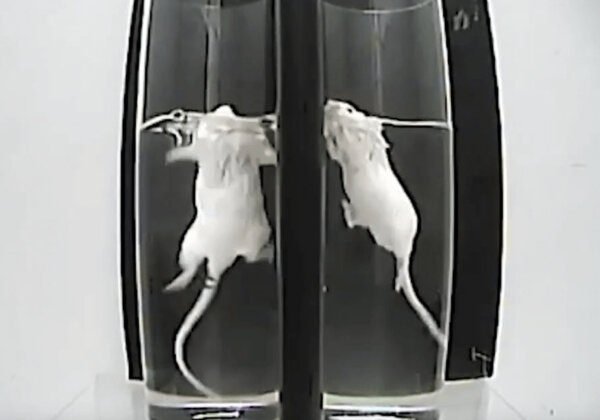No More Treading Water: Australian Research Council Joins Forced Swim Test Ban
There’s another nail in the coffin for the cruel forced swim test in Australia: the Australian Research Council (ARC) has endorsed the National Health and Medical Research Council’s (NHMRC) decision to prohibit funding any experiments that use the forced swim test to model human depression in order to study “depression-like behaviour” or anxiety disorders and their treatment.
The ARC acts as the government’s primary non-medical research funding agency, and the decision will prevent mice, rats, and other small animals from being used in experiments in which they are often dosed with a test substance and are then dropped into inescapable beakers of water. Experimenters watch as the animals frantically swim for their lives and struggle to stay afloat in the debunked belief that this reveals something about human depression.
The ARC’s decision comes after pressure from Animal-Free Science Advocacy, following successful requests by PETA and Animal-Free Science Advocacy for NHMRC to update its policy last year.
While NHMRC stopped short of implementing a full ban, these new requirements will significantly reduce, if not eliminate, the use of the forced swim test in Australia. The policy also states that experimenters funded by NHMRC who are currently using the test must re-evaluate their project within three months and that animal ethics committees must include compelling justifications for using the forced swim test in their annual reports. PETA entities around the world have been pressing for an end to the use of the test globally, and NHMRC’s report cites our work on this issue. PETA will continue to monitor any lingering use of the forced swim test in Australian laboratories.
Putting an End to the Forced Swim Test
Forcing frantic animals to swim for fear of drowning is both physically and psychologically abusive – not to mention irrelevant to human depression. Analysis of data from 15 major pharmaceutical companies shows that the forced swim test doesn’t accurately predict whether a compound will have antidepressant efficacy in humans.
Scientists all over the world – including at top pharmaceutical companies such as Bristol Myers Squibb, Pfizer, AstraZeneca, AbbVie, GSK, and Roche – are no longer wasting time and money on this test. The NHMRC’s decision is part of a trend toward good science: in the last year alone, PETA aided NZAVS in securing New Zealand’s ban on the bogus test, more than a dozen UK research universities confirmed that they neither use the cruel test nor intend to do so in the future, and the University of Western Australia joined other universities across the country in confirming that it has ended its use of such experiments.
Now, we’re asking The Florey, La Trobe University, the University of Melbourne, Monash University, and the University of Queensland to join them. Allowing the forced swim test to continue at Australian universities advances nothing but cruelty to animals. Take action by adding your name to our petition:








